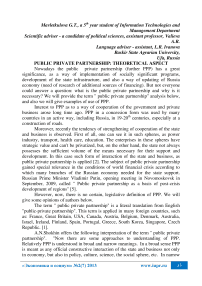Public private partnership: theoretical aspect
Автор: Mavletkulova G.t
Журнал: Экономика и социум @ekonomika-socium
Статья в выпуске: 2-2 (7), 2013 года.
Бесплатный доступ
Короткий адрес: https://sciup.org/140124487
IDR: 140124487
Текст статьи Public private partnership: theoretical aspect
Language adviser - assistant, L.R. Ivanova Baskir State Agrarian University, Ufa, Russia PUBLIC PRIVATE PARTNERSHIP: THEORETICAL ASPECT Nowadays the public private partnership (further PPP) has a great significance, as a way of implementation of socially significant programs, development of the state infrastructure, and also a way of updating of Russia economy (need of research of additional sources of financing). But not everyone could answer a question: what is the public private partnership and why is it necessary? We will provide the term " public private partnership" analysis below, and also we will give examples of use of PPP.
Interest to PPP as to a way of cooperation of the government and private business arose long time ago. PPP in a concession form was used by many countries in an active way, including Russia, in 19-20th centuries, especially at a construction of roads.
Moreover, recently the tendency of strengthening of cooperation of the state and business is observed. First of all, one can see it in such spheres, as power industry, transport, health care, education. The enterprises in these spheres have strategic value and can't be privatized, but, on the other hand, the state not always possesses the sufficient volume of the means necessary for their support and development. In this case such form of interaction of the state and business, as public private partnership is applied [2]. The subject of public private partnership gained special relevance in the conditions of world financial crisis according to which many branches of the Russian economy needed for the state support. Russian Prime Minister Vladimir Putin, opening meeting in Novomoskovsk in September, 2009, called " Public private partnership as a basis of post-crisis development of regions" [5].
However, now, there is no certain, legislative definition of PPP. We will give some opinions of authors below.
The term " public private partnership" is a literal translation from English "public-private partnership". This term is applied in many foreign countries, such as: France, Great Britain, USA, Canada, Austria, Belgium, Denmark, Australia, Israel, Ireland, Finland, Spain, Portugal, Greece, South Korea, Singapore, Czech Republic. [1].
A.N.Shokhin offers the following interpretation of the term " public private partnership". "Now there are some approaches to understanding of PPP. Relatively PPP is understood in broad and narrow meanings. In a broad sense PPP is meant as any official constructive interaction of the state and business not only in economy, but also in policy, culture, science, the social sphere, etc. In narrow sense the public private partnership is understood as business and state interaction in the course of realization of exclusively significant projects having strategic nation-wide value" [6].
A.A.Spiridonov offers the following definition of PPP: "PPP is legally issued relations of authorities and subjects of business concerning the objects being in jurisdiction of the state, based on obligatory division of risks, the accounting of interests and coordination of efforts of the parties, carried out for the most effective implementation of the projects having important public and state value" [5].
There are many various definitions of PPP. Most general of them gives the World Bank: "PPP is agreement between the public and private parties concerning production and rendering the infrastructure services, attraction of additional investments concluded with the purpose and that is even more important, as means of increase of efficiency of the budgetary financing". In the USA PPP is the agreement fixed in a contractual form between the public and the private company, allowing the latter to participate in state ownership in the coordinated form and to execute the functions which are traditionally lying in the sphere of responsibility of the public power. Such agreement usually assumes existence of the contract of the relevant governmental agency with the private company the subject of which is reconstruction, building of object of state ownership and (or) its operation, management, etc. Basic rights of property concerning this object don't change, and the state even after transfer of object to the private company remains its owner. The term SPP defines a wide range of the relations in the range from more or less simple contracts under which the private company assumes certain risks and agrees on system of penalties, to the complex, technically difficult projects including construction, modernization, operation of objects and management of them" [6].
Still there is no standard legal definition of concept PPP at federal level though it is applied in various regulations. Though the regional legislation stepped forward: in many subjects of the Russian Federation laws on PPP (St. Petersburg, the Tomsk region, Dagestan, Mountain Altai, and the Republic of Bashkortostan) are adopted, etc., concept PPP and its forms are perpetuated in some of them. However unique definition of concept PPP doesn’t exist.
Also term PPP is used as "a state and business pooling of funds", "institutional and organizational alliance". Models of "social responsibility of business", "charity", "subsidies to private business", and also "privatizations" (though in practice there is a place of partial privatization) are applied.
Drawing a conclusion it is possible to notice that each participant of the relations in PPP sphere treats PPP definition in own way that is obviously connected with the lack of the conventional, legislatively fixed definition.
Thus, it is possible to draw a conclusion that PPP is contractual relation of authorities and subjects of the business based on obligatory division of risks to achieve the effective implementation of the state socially significant projects.


